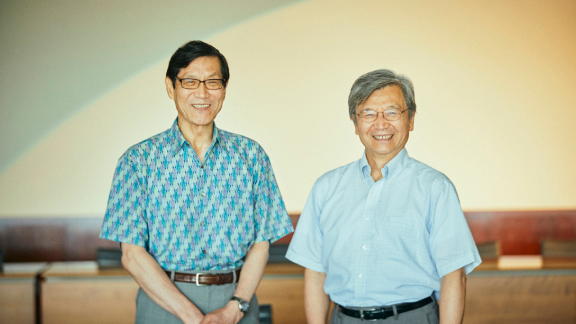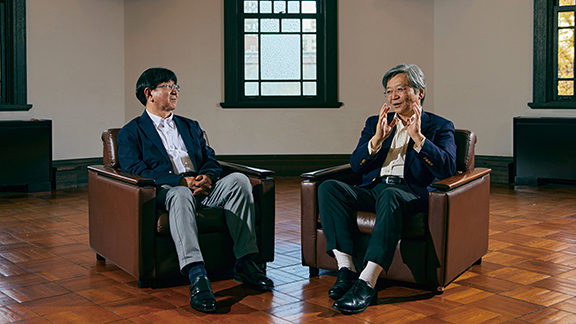Dialogue series Vol.2
A future that even Einstein could not have imagined is coming.
As research into the practical application of quantum computers accelerates, the Faculty of Information and Mathematical Sciences, which is scheduled to open in 2024, plans to establish a Mathematical and Quantum Information Course. In this issue, Professor Kazutoshi Ota of the Faculty of Law, who is involved in organising the course's curriculum, and Hirotaka Irie, who is engaged in quantum computer research at Denso Corporation, discuss the kind of human resources and education required in the 'quantum age'.

Director, Quantum Computing Research Section, Doctor of Science.
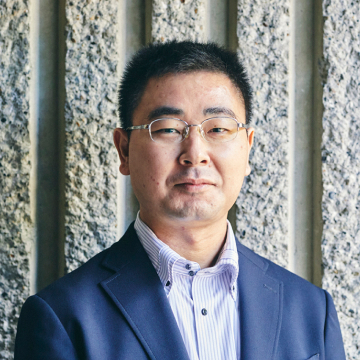
Member of the Preparatory Office for the Establishment of the Center for Interdisciplinary Informatics, Faculty of Information and Mathematical Sciences
Professor, Department of Consumer Information and Environmental Law, Faculty of Law, Meiji Gakuin University
Member of the Preparatory Office for the Establishment of the Centre for the Interdisciplinary Area of Information Science, Faculty of Information and Mathematical Sciences
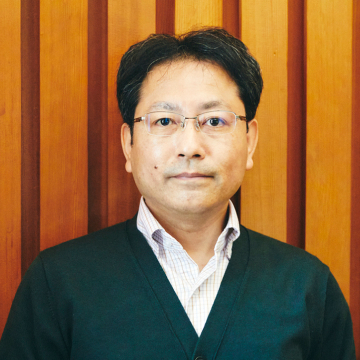
Table of Contents
- Encounters that crossed university and business boundaries and were drawn together by their connections as researchers in particle theory.
- Computers that are not just 0s and 1s! The 'quantum age' is upon us.
- What is a quantum computer for and in what situations can it be used effectively? It makes sense to learn about it now, when it is still developing.
- To make information education still relevant 10 or 20 years later.
- A generation of "quantum natives" will be born, just like the "digital natives".
Encounters that crossed university and business boundaries and were drawn together by their connections as researchers in particle theory.
What is your relationship to each other?
Both Irie and I have a background in physics, and we both conducted research in particle theory, particularly in the field of mathematical science, which makes extensive use of mathematics, such as field theory and superstring theory, and we used to participate in research conferences together. After that, I moved to the University and we didn't see each other for a while, but in the process of conceiving the establishment of the Faculty of Information and Mathematical Sciences together with President Murata, it became necessary to look for researchers who were familiar with quantum computers and quantum information. It was right around that time that I read a manuscript that Irie-san had contributed to the Journal of the Physical Society, which reminded me of those days, and I asked him to join me, and we have been exchanging various opinions for about a year now.
My original specialisation was particle theory (superstring theory/mathematical physics), the same as Dr Ota's, and I entered this world fascinated by particle theory, which approaches the truth of the universe using only paper and pencil. After obtaining my degree, I worked as a post-doctoral researcher for eight years, both domestically and internationally, before leaving academia to work for a company. The field of superstring theory, in which I have been engaged, aims to elucidate the mechanisms of the universe and pursue the ultimate laws of physics, while at the same time actively applying the mathematical theory (mathematics) obtained in this field to other fields. I wanted to utilise the advanced mathematics I had developed through research into superstring theory for real-world applications, so I started working for a semiconductor venture company in order to create quantum devices. Later, I heard that Denso had started research on real-world applications of quantum computers, so I joined Denso in 2018 and have been engaged in applied research on quantum computers ever since. It was in this context that Dr Ota approached me and gave me the opportunity to express my thoughts to the students as a company about the newly established faculty at Meiji Gakuin University.
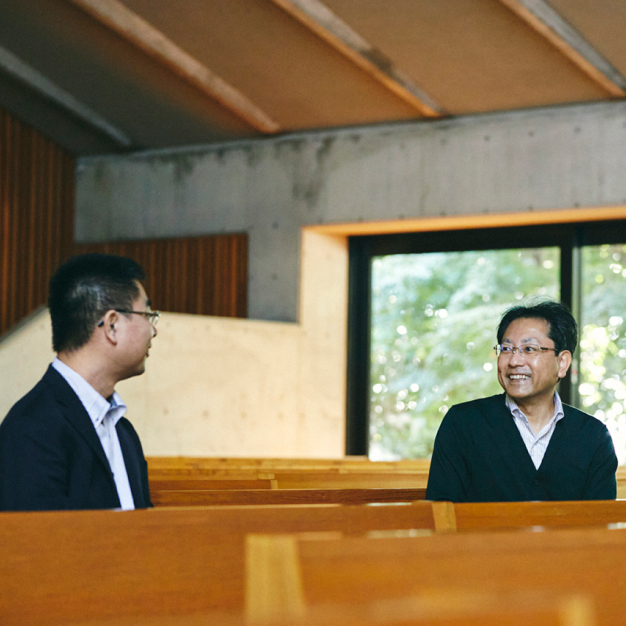
How does the study of particle theory and superstring theory connect with information in the mathematical field?
Rather than particle theory or string theory per se, the concepts and mathematical ideas dealt with in these studies are very important for deepening the world of information. Particle theory treats elementary particles, which are the smallest units that make up matter, in terms of the concept of quantum, which has both wave and particle properties. Superstring theory is also constructed on the assumption that subatomic particles are string-like rather than point-like. Just as Newton created derivatives and integrals to describe the motion of celestial bodies, quantum mechanics and many new mathematical methods were created to describe the motion of quanta, which behave in a completely different way from the conventional laws of physics. Today, quantum computers are attracting attention in the information world. Quantum computers are computers that process information using the properties of the 'quantum' atoms and other constituents of matter, and are expected to enable complex calculations that cannot be solved by conventional computers. As information technology and network services continue to evolve, society may come to require people who understand mathematics and physics and who can use quantum computers on a daily basis. Therefore, we would like students to study informatics linked to quantum mechanics, or "quantum information", at the Faculty of Information Mathematics and Science, where they will learn about mathematics in the field of information and its utilisation for the coming age.
Computers that are not just 0s and 1s! The 'quantum age' is upon us.
Can you tell us a little more about the principles of quantum computers?
It would be a computer that can precisely control quantum information and use it for calculations. In the world of so-called Newtonian mechanics, common sense dictates that two states cannot occur simultaneously. For example, when an electric current flows through a coil, it is caused by the motion of a charged particle, but a charged particle can only have either a rightward or leftward motion. In the quantum world, however, rightward and leftward motion can exist simultaneously. In relation to information, current general computers, including supercomputers, are machines that handle bit information, in which information is expressed as bits of 0s and 1s, and bit information has only one state, either 0 or 1. In contrast, in the quantum world, two states, 0 and 1, can exist simultaneously and operations can be performed on each simultaneously. Quantum computers handle quantum information in which these overlapping 0 and 1 states exist.
Understanding the working principles of quantum computers requires knowledge of quantum mechanics, which describes quantum behaviour. The information available in the quantum world is probabilistic and its value can only be determined by observation, which is very difficult to explain in words alone. Ultimately, it cannot be accurately conveyed without the use of mathematical formulae. Even Einstein had a hard time accepting the idea of quantum mechanics.
The 2022 Nobel Prize in Physics was awarded to a researcher in quantum information.
He was recognised for his contribution to the development of quantum information science by experimentally confirming the overlapping state of 0s and 1s that Mr Irie spoke of. Interestingly, it was Einstein who also triggered quantum mechanics, the basis of quantum information. He is best known for his theory of relativity, for which he did not win a Nobel Prize. The Nobel Prize was awarded in 1921 for his work on the photoelectric effect. He theoretically clarified the phenomenon of electrons being ejected when light strikes a metal surface, which led to the establishment of the quantum concept and the development of quantum mechanics. A century later, quantum computers appeared, and the Nobel Prize was awarded for research into quantum information.
Without quantum mechanics, semiconductor devices would not exist, and our lives have benefited abundantly from quantum mechanics. It is said that the future is the 'age of the quantum', which means that we are now in an age where we can control quantum in our daily lives. With the advent of quantum computers, we can actually create and manipulate states where the zeros and ones of quantum information overlap and use them for calculations by programming them, even from our own computers at home. I feel that this Nobel Prize is a fitting event to mark the beginning of the quantum age.
The smartphone cameras that are familiar to people today also use the photoelectric effect, so this is another contribution of quantum mechanics. What is quantum mechanics useful for? When people ask, "What does quantum mechanics do for you?", all they have to do is point to the camera on their smartphone (laughs). After 100 years, even pure mathematics and physics research can lead to unexpected places in this way, so it is clear that learning cannot be viewed only from a short-sighted perspective.
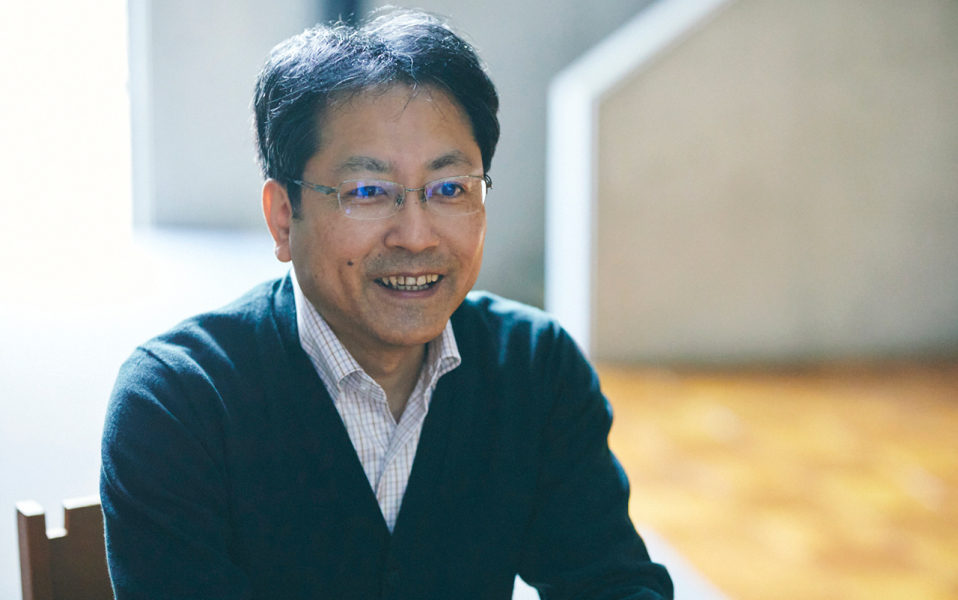
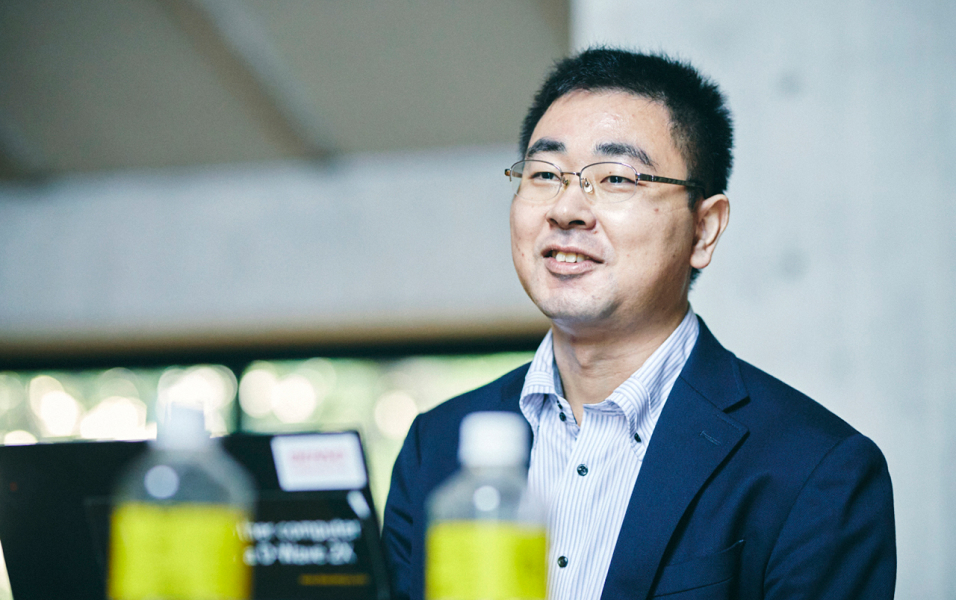
What is a quantum computer for and in what situations can it be used effectively? It makes sense to learn about it now, when it is still developing.
Specifically, where can quantum computers be used?
Quantum information is expressed in the form of wave functions, which are determined to be 0 or 1 only after observation, using mathematics such as probability and complex numbers. Quantum computers are a way for us to control this information and use it for something useful in the world. At present, the control of quantum computers requires cryogenic superconductors and huge vacuum devices, and the current quantum computers are all large-scale. Also, quantum information is fragile and the quantum machines available today are noisy, so they are not immediately useful to society.
Some people may think that all current computers will be replaced by quantum computers, but conventional computers also have their own areas of expertise, which need to be separated from the situations in which quantum computers will play an active role. There are aspects of the world where expectations for quantum computers are overly heated, so accurate knowledge and understanding, including the limits of application of quantum computers, will be required in the future.
Quantum computers are known to be most effective for specialised tasks. The most famous example is Shore's algorithm for decrypting the RSA cipher used in credit card transactions and server authentication. At the moment, it takes years to crack the code using even the fastest supercomputers, but a quantum computer could potentially do it in a relatively short time. On the other hand, processes such as payroll calculations are considered to be far more efficient on a normal computer.
I wouldn't want my salary to be interpreted as a probability, or that it was less when I observed it (laughs).
As a corporate researcher, my stance is to determine the areas in which quantum computers excel, and then prepare to actually develop businesses and services that use them. Using me as an example, I would first envisage applications in the area of optimisation. At present, vehicles are being electrified, and as this happens, they will become more and more like devices. And as well as demanding services that improve convenience in various ways, a huge amount of information on these services will be stored in the cloud. In this case, it will be necessary to come up with algorithms to convert the collected data into useful information, which will require very large-scale and complex calculations in the future. This is where quantum computers could be used. However, as Dr Ota said, quantum computers alone will not solve the problem. In reality, the majority of current computing technology is based on current computers, and we need to build a system based on that, and then think about how and where to use quantum computers.
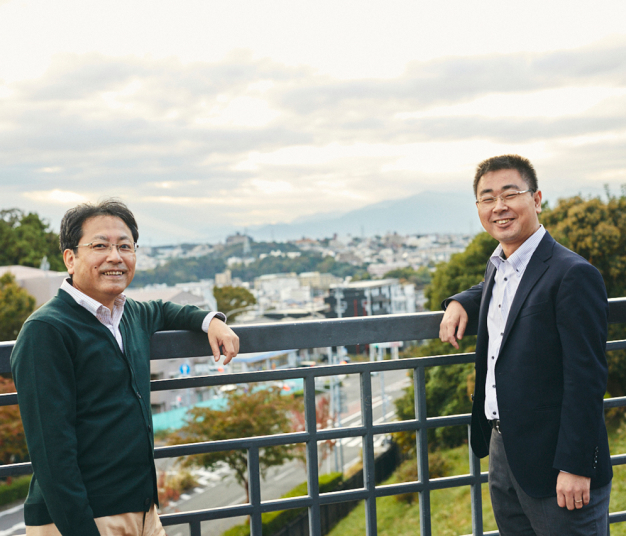
List of articles in dialogue
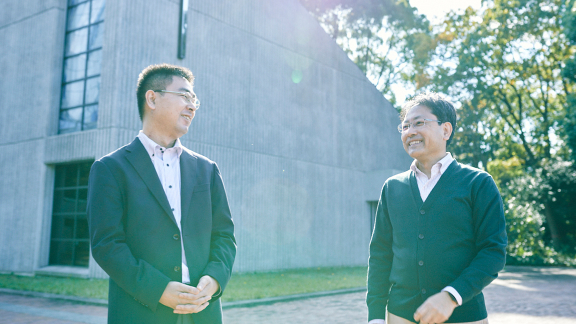 Mr. Irie (Denso) ・ Prof. Ota ed.
Mr. Irie (Denso) ・ Prof. Ota ed. Dialogue Series Vol.2 A future is coming that not even Einstein could have imagined. ― The world of "information" changed by quantum mechanics. From there, the Faculty of Information and Mathematical Sciences learns from a future perspective.
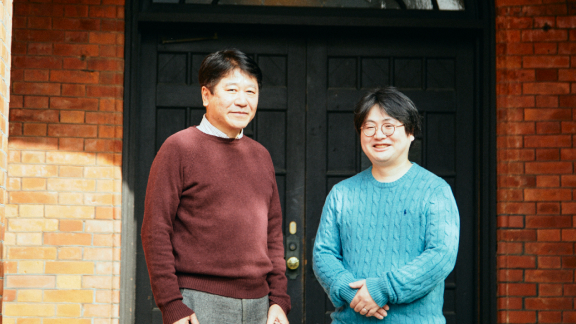 Prof. Kameda and Associate Prof. Inukai, eds.
Prof. Kameda and Associate Prof. Inukai, eds. Dialogue Series Vol.3 Updating the humanities and social sciences with the power of information mathematics! ― Information mathematics is a communication and hub that connects disciplines and people.
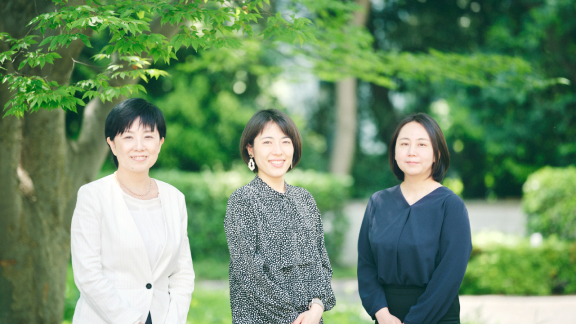 Female Researchers Edition
Female Researchers Edition Dialogue Series Vol.4 A background in informatics and mathematics is the foundation of all science. ― Great Expectations for Integration with Diverse Fields


